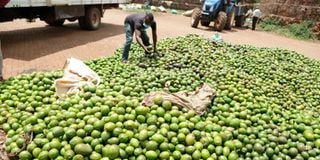Premium
Savvy farmers capitalise on growing demand for avocado in export markets

A man spreads out his avocado produce at Keumbu Market in Kisii in August 2020. Middlemen were buying a sack of the fruit at a paltry Sh800.
A few years back, Grace Ngungi took a leap of faith and began pulling down the coffee plants on her 400-hectare farm in Juja, Kiambu County, to replace half the farm with avocado trees.
She went ahead and invested a substantial amount of her savings into buying nearly 4,000 avocado seedlings, confident that the returns on investment would outweigh the cost of production.
“If I was to commercialise the 4,000 trees, with each tree giving me about 200 pieces of avocado which I would sell at Sh44 a piece in the export market, in just the first harvesting season, I would manage a gross return of nearly Sh36 million,” says Ms Ngungi.
Like many other farmers who have followed suit, Ms Ngungi made the shift to avocado to increase her earnings. She sought to capture the growing demand of avocado in export markets, demand that has made the fruit a more lucrative export product in comparison to other cash crops.
International market
Indeed, fierce competition among foreign markets has seen the value of products such as coffee drastically decline. While a kilo of coffee in the international market goes for about Sh115, a kilogram of avocado in Europe and the Middle East, where Kenya exports most of its avocado, goes for about Sh800, this, even when the cost of production for avocado is much lower than that of coffee.
Avocado is also easier to grow, does not require much pesticides, fertilizers or insecticides, and unlike other cash crops such as coffee which require a lot of water to grow, avocado can survive even in semi-arid conditions, the kind of conditions you will find in most parts of Kenya.
According to data from the Horticulture Directorate, Kenya produced almost 365,000 tons of avocado in 2019. Ten years prior to that, the country produced only 145,000 tons, a 60 percent jump in production.
While a majority of the avocado produced has been consumed locally, the increase in international demand has seen smallholder farmers (who make up for 80 percent of avocado growers in the country) take a keen interest in the export market. These farmers are now coming together to form lobby groups which will enable them to cut out brokers and fetch better returns for their avocado from the international market.
Harvesting
“Some brokers encourage farmers to harvest their avocados before they are ready for harvesting, telling them that they will be ripe before they get to market. What happens instead is that the avocados rot or harden when they get there. Farmers might sell to the brokers before the avocado is ready for harvest out of desperation,” observes Ms Ngungi, adding that farmers are wiser now, having seen that coming together to form structured and secured markets is key to addressing the issues they are facing. The farmer is therefore assured of better prices than those offered by brokers.
Avocado now accounts for nearly half of the country’s fruit exports, and nearly one fifth of the country’s horticultural exports. In the year 2020, Kenya exported nearly 70,000 tons of the fruit, a 16 percent jump from 59,000 tons exported in 2019, fetching the country Sh14 billion in foreign revenue.
Between January and March this year, Kenya exported 26,481 tons of avocado compared to 15,101 within the same period last year. Indeed, the value of Kenya’s avocado exports jumped by 93 percent from what was recorded in Q1 of 2020 to hit Sh4.26 billion in the first quarter of 2021.
Kenya is currently ranked as the eighth largest producer of the avocado fruit in the world. The variety that is mostly grown for the export market is the Hass avocado, as this variety has a longer shelf-life, making it more desirable for the export market.
The avocado export market in Kenya is dominated by five major exporters - Kakuzi, Vegpro, Sunripe, Kenya Horticultural Exporters and East African Growers, but smaller players are now coming in to partake in the fruits of this lucrative market.
Consumed locally
As it stands however, the country is yet to exploit its full potential as an exporter of avocado, as only 10 percent of the avocado produced in Kenya is exported to foreign markets. The majority is still consumed locally.
Hosea Machuki, the Chief Executive Officer of farmers’ lobby group Fresh Produce Exporters Association of Kenya (FPEAK), notes that this could however quickly change as farmers outside traditional growing zones embrace the fruit, thereby expanding the area under cultivation.
“While avocado has previously been grown mostly in parts of Central Kenya, cultivation of the crop has now shifted to other areas such as Western Kenya and Rift Valley, where farmers are uprooting tea plantations to reap more revenue from avocado,” says Mr Machuki.
He, however, notes that the full potential amongst small holder farmers is still inhibited by constraints which arise from lack of sufficient capital to purchase and grow high quality avocados and also to participate in export markets.
“Integration with export markets remains a difficult barrier for individual smallholder farmers to overcome. Usually, these farmers have to incur the initial production and shipping costs on their own then wait weeks to be paid for their produce,” he notes.





